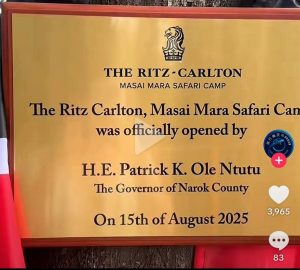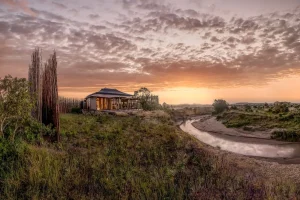Investigations
The Ritz-Carlton Scandal: How a $3,500-a-Night Lodge Is Destroying Africa’s Greatest Wildlife Wonder
This is how environmental destruction proceeds in plain sight: through legal mechanisms that prioritize property rights and commercial interests over ecological integrity and public concern.
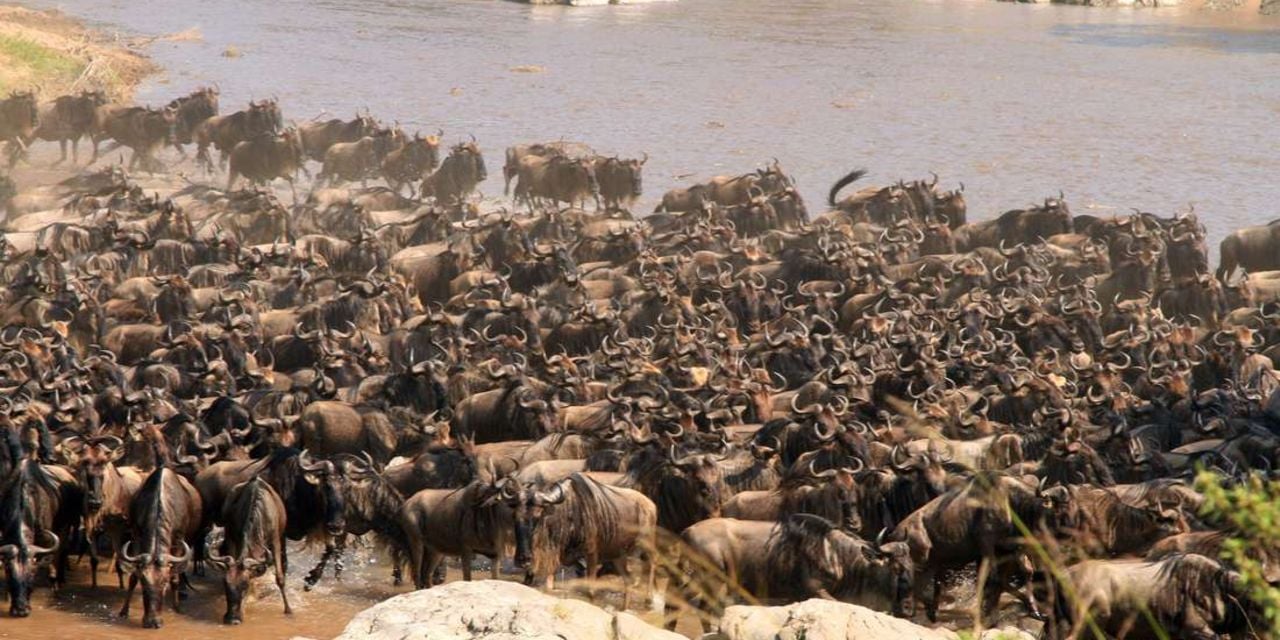
The wildebeest don’t carry passports or understand property deeds. For millennia, they have followed ancient pathways etched into their collective memory, crossing the Sand River between Tanzania’s Serengeti and Kenya’s Maasai Mara in a spectacle that scientists call the greatest terrestrial wildlife migration on Earth.
But this year, something stands in their way: a luxury safari camp charging guests more per night than most Kenyans earn in three months, built directly on the banks of the very river the animals must cross to survive.
The Ritz-Carlton Maasai Mara Safari Camp opened in August 2025, and from the moment Marriott International announced it, the controversy has been explosive.
Twenty tented suites, each with infinity plunge pools, indoor and outdoor showers, and private sunken lounges, promising guests a “front-row seat to experience the majesty of the Great Migration.”
What Marriott marketed as the peak of luxury travel in Africa, conservationists and Maasai elders are calling an ecological catastrophe wrapped in designer linens.
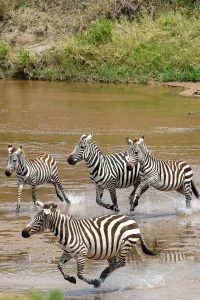
Zebras run across the Sand River near the Ritz-Carlton Masai Mara Safari Camp, which opened in August. The area is also a major migration point for wildebeest. Credit…/Reuters
Dr. Meitamei Olol Dapash didn’t waste time with polite letters. The Maasai elder and director of the Institute for Maasai Education, Research and Conservation filed a lawsuit the same day the camp opened, accusing Marriott International, Ritz-Carlton, their Kenyan partner Lazizi Mara Limited, and local authorities of building the camp in the middle of a corridor used by wildebeest during the Great Migration.
His demand is uncompromising: tear it down, restore the landscape, plant native trees before next year’s migration arrives.
The evidence supporting his case is damning.
Grant Hopcraft, an ecologist who has been tagging wildebeest movement in the Mara since 1996, wrote directly to Kenya’s Environment and Land Court in July stating categorically that “the proposed lodge sits directly on one of the major wildlife corridors between Serengeti and the Masai Mara.”
Joseph Ogutu, a Kenyan researcher at the University of Hohenheim in Germany who has studied wildlife migration in the Mara for over 30 years, was even more blunt: “Data does not lie, specifically when it has been collected over a 50-year period and it says the same thing: That place in the river is critical.”
Yet the Kenya Wildlife Service, in a sweeping defense issued just days ago, claims that GPS collar data from more than 60 wildebeest tracked between 1999 and 2022 proves the Sand River site is not within a migration corridor.
The contradiction isn’t just stark, it’s suspicious. How can decades of scientific research by independent ecologists studying the same animals in the same location reach the exact opposite conclusion from government data that conveniently supports a politically connected development?
The timing of this project exposes the rot at the heart of Kenya’s environmental governance.
Just five months before the Ritz-Carlton opened, officials from Narok County, including individuals with direct ties to Governor Patrick Ole Ntutu, sat in Serengeti National Park at the Seventh Stakeholders Forum of the Greater Serengeti-Mara Ecosystem.
For three days between March 28 and 30, 2025, they listened to scientists from the Greater Serengeti-Mara Conservation Society, comprising Tanzanian, Kenyan, and international conservation professionals, deliver findings that should have stopped the Ritz-Carlton dead in its tracks.
The forum’s conclusions were unequivocal and terrifying. Current tourist pressure in the Maasai Mara is unsustainable.
Mass tourism is already impairing the wildebeest migration and compromising ecological integrity.
The scientists recommended prohibiting new lodges and camps in designated wilderness areas and withdrawing licenses for facilities in sensitive zones.
They specifically warned against “construction of tourism infrastructure in locations that negatively affect protected areas or block wildlife corridors.”
Yet Governor Ole Ntutu, whose signature appears on the Maasai Mara National Reserve Management Plan 2023-2032 that placed a moratorium on new lodges until 2033, personally attended the Ritz-Carlton’s grand opening on August 15, 2025.
The inaugural plaque commemorating his presence stands as a monument to administrative hypocrisy.
This wasn’t ignorance.
It was a conscious choice to prioritize luxury development over scientific evidence, to value political connections over ecological survival.
How did this happen?
Through a presidential exemption. Felix K. Koskei, chief of staff to President William Ruto, granted Marriott “a one-time exemption” from the moratorium “as part of the government’s commitment to cultivate a favorable business environment and facilitate both domestic and foreign investment.”
One sentence, and decades of conservation planning collapsed.
The Maasai Mara Management Plan, crafted through years of joint scientific assessments between national and county governments, became worthless paper the moment political expediency demanded it.
The numbers tell a story of an ecosystem under siege. In 2012, there were 95 camps and lodges in the reserve. By 2024, that number had exploded to 175. The Ritz-Carlton isn’t just another lodge.
It’s the breaking point, the development that proves no protected area is actually protected when enough money and political power align against it.
Dr. Ogutu warned that everyone should be alarmed by this exponential growth, pointing to species that have already gone extinct in the Mara: the roan antelope, African wild dog, lesser kudu, and oryx. “Tourism has been growing exponentially in Kenya since the 1900s,” he said, “but the wildlife is declining exponentially.”
More tourists mean more vehicles driving off-road, scaring animals and destroying the vegetation they graze on.
Wastewater from lodges flows into the Mara and Sand Rivers.
Light pollution and noise harm wildlife. In 2023, viral video showed safari vehicles full of tourists circling two cheetahs as they hunted, turning natural predation into a circus.
The scientists at the March forum warned that without policy changes, continued degradation could lead to the collapse of key ecological features of the Serengeti-Mara ecosystem by 2030. That’s less than five years away, and instead of stopping development, Kenya is fast-tracking it.
The procedural violations are equally outrageous. Julius Manchau Liaram, a Maasai herder, discovered his signature on documents claiming the community approved the Ritz-Carlton project.
There’s just one problem: he never attended any meeting about it.
“They say I went to a meeting about the Ritz-Carlton, but I did not,” he stated flatly. “I wouldn’t have approved if I went.” He filed a police report immediately but suspects whoever forged his signature assumed he’d never find out.
“Many of our people have not gone to school, so some powerful people did not think we would say anything. They think we won’t stand up for ourselves.”
This isn’t an isolated incident.
It’s emblematic of how development proceeds in areas where local communities lack political power. The National Environment Management Authority claims it held meetings with locals and obtained their consent.
But when community members say they never attended these meetings and their signatures were forged, what does that consent mean? It means nothing.
It’s a bureaucratic fiction designed to provide legal cover for decisions already made in corporate boardrooms and government offices far from the Mara.
The Ritz-Carlton camp is now surrounded by a makeshift wall of dirt and grass that keeps non-guests from looking in. But the wall can’t keep wildlife out. Recent drives around the perimeter reveal tracks every few feet where animals have tried to climb over or walk through.
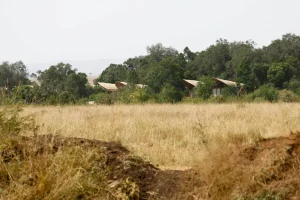
A makeshift wall of dirt and grass surrounds the Ritz-Carlton camp. Along it are spots where animals have attempted to get through. Credit…/Reuters
Jonathan Koshal, a 39-year-old Maasai guide who owns the tour company Eye of Masai, sees the wall as a clear example of the company wanting to separate its guests from everyone else. “Tourists don’t know what is happening to us because when they stay at a luxury camp, they are disconnected from the community,” he said.
And there’s another lodge under construction that makes the Ritz-Carlton controversy even more disturbing.
A prominent Kenyan senator from Narok County is building his own lodge within the Olkinyei Forest, near the Olare Orok River, in the heart of the principal protection zone of the Maasai Mara National Reserve.
The same management plan violated by the Ritz-Carlton is being trampled again by an elected official who was chosen by the Maasai people to represent them and ensure legal compliance. When the people writing the laws are the same people breaking them, the system isn’t just corrupt, it’s captured.
The scientific forum warned specifically about this location, identifying it as part of the critical connectivity the Greater Serengeti-Mara Ecosystem needs to survive.
They noted the alarming collapse of wildebeest migration on the Mara-Loita Plains, where populations plummeted from 140,000 to fewer than 15,000. The animals didn’t vanish. They stopped migrating because their routes became impassable.
The forum emphasized that connectivity is vital for wildebeest, zebra, gazelle, elephants, giraffes, black rhinoceroses, buffalo, and large river fish. Break the connectivity, and entire populations collapse.
The Sand River, where the Ritz-Carlton sits, flows into the Mara River just 1.2 kilometers downstream.
The forum warned that rivers in the Serengeti-Mara are under serious threat, with some formerly perennial watercourses becoming seasonal due to loss of vegetation cover.
They stated that a drought lasting just ten days during dry season could result in mass mortality of up to 300,000 migratory wildebeest.
The Sand River is identified as a dry season refuge, meaning it’s exactly where wildlife concentrates when water becomes scarce.
Building a luxury lodge requiring massive water consumption in a dry season refuge during a regional water crisis isn’t just irresponsible, it’s suicidal for the ecosystem.
Justin Landry, the Ritz-Carlton camp’s general manager, insists that 90 percent of the team comes from Kenya, with 40 percent from the local community, and that the company “supports inclusive growth, fosters local pride and strengthens our connection to the community.” But Dominic Kasoe, 30, who grew up near the reserve, has a different description for multinational companies running rampant without regard for locals and wildlife: “parasites.”
Emmanuel Sananka, a 26-year-old software engineer who lives half a mile from the reserve, understands what’s at stake beyond ecology.
“If Marriott and Ritz-Carlton are allowed to stay where they are, it will set a precedent and a culture that anyone who wants to can operate this way, with no regard for the people and wildlife. We need to send a message to our community that their voice matters even if Marriott has so much power.”
The Kenya Wildlife Service dismisses much of the criticism as outdated material from 2018 and 2020, suggesting competing commercial interests are driving opposition.
This is gaslighting on an institutional scale.
The scientific forum in March 2025 wasn’t organized by commercial competitors. It was convened by conservation professionals who have dedicated their careers to studying this ecosystem.
Their conclusions weren’t based on old photographs or commercial rivalry. They were based on 50 years of data showing an ecosystem approaching collapse.
Marriott isn’t slowing down.
In early 2026, they’re opening a JW Marriott Mount Kenya Rhino Reserve and a JW Marriott luxury safari lodge in Serengeti National Park, a protected UNESCO World Heritage site.
The template is clear: use political connections to obtain exemptions from environmental protections, forge community consent documents, deploy government agencies to defend the development with contradictory data, and silence critics through gag orders and litigation.
Dr. Dapash, who filed the lawsuit challenging the Ritz-Carlton, has been effectively muzzled by court-issued gag orders. The courts haven’t ruled on the merits of his case. They’ve simply stopped him from speaking about it. This is how environmental destruction proceeds in plain sight: through legal mechanisms that prioritize property rights and commercial interests over ecological integrity and public concern.
Tilal Ole Sairowa, a 71-year-old Maasai elder and livestock keeper, speaks for many when he says, “Two generations of Maasai children have gone to schools built by tourists, hospitals built by tourists, and benefited from scholarships given by tourists. We do not want to stop tourism, we want it to be managed better by the local government and the park authorities.”
The Maasai people aren’t opposed to tourism.
They’re opposed to parasitic tourism that extracts wealth while destroying the ecological and cultural foundations that make the Mara valuable.
They’re opposed to developments that promise community benefits while forging community consent. They’re opposed to presidential exemptions that make environmental protections worthless.
They’re opposed to GPS data that contradicts 50 years of independent scientific research. They’re opposed to walls that keep them out of their ancestral lands while charging foreign tourists $3,500 per night for “authentic” safari experiences.
The Greater Serengeti-Mara Ecosystem doesn’t need more luxury lodges.
It needs enforcement of existing protections, respect for scientific evidence, transparency in environmental assessments, and genuine community consent that isn’t forged on documents by faceless bureaucrats.
It needs political leaders who understand that short-term profits from luxury tourism mean nothing if the migration that attracts tourists collapses entirely.
The wildebeest will return to the Sand River when the rains come. They always have. The question is whether they’ll find a crossing or a wall. Whether they’ll find water or wastewater.
Whether they’ll find a pathway or a luxury camp with infinity pools. And if they can’t cross, they won’t simply find another route. The data from the Mara-Loita Plains proves that. They’ll stop coming, and when they stop coming, the greatest wildlife spectacle on Earth dies with them.
The Ritz-Carlton Maasai Mara Safari Camp offers guests a front-row seat to the Great Migration. What it’s actually offering is a front-row seat to ecological collapse, served with indoor and outdoor showers.
Kenya doesn’t need a Ritz-Carlton in the Maasai Mara. It needs the courage to admit that some places are too precious to sacrifice for luxury, no matter how much political pressure Marriott International can bring to bear. The migration has survived for millions of years. The question is whether it can survive us.
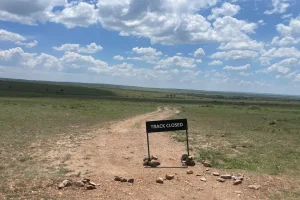
A dirt road that passes near the Ritz-Carlton camp has been closed to other drivers. Credit…Tariro Mzezewa
Additional reporting by New York Times
Kenya Insights allows guest blogging, if you want to be published on Kenya’s most authoritative and accurate blog, have an expose, news TIPS, story angles, human interest stories, drop us an email on [email protected] or via Telegram
-

 Business1 week ago
Business1 week agobetPawa Empire Crumbles: Mr Eazi’s Betting Gambit Unravels Amid Partner’s Shadowy Deals
-

 News6 days ago
News6 days agoDCI Probes Meridian Equator Hospital After Botched Procedure That Killed a Lawyer
-

 Business5 days ago
Business5 days agoMinnesota Fraud, Rice Saga, Medical Equipment Deal: Why BBS Mall Owner Abdiweli Hassan is Becoming The Face of Controversial Somali Businessman in Nairobi
-

 Business1 week ago
Business1 week agoKRA Boss Humphrey Watanga In Big Trouble In Sh5.5 Billion Rice Import Scandal
-

 Investigations2 weeks ago
Investigations2 weeks agoKERRA Homa Bay Region Manager Calvince Thomas Accused of Swindling Businessman Ksh 2 Million in Phantom Tender Deal
-

 Business1 week ago
Business1 week agoState Set to Demolish Pastor Ng’ang’a’s Church in Sh28 Billion Railway City Push
-

 Business6 days ago
Business6 days agoControversial Turkish Firm Celebi Canceled in India Over Security Concerns Acquires Strategic Property in Nairobi’s Main Airport
-

 Investigations1 week ago
Investigations1 week agoEXPOSED: SHA Officials Approve Higher Payments for Family, Friends as Poor Patients Pay Out of Pocket

